 Back to selection
Back to selection
PORTENTS OF GREEK CRISIS IN IMAGES FROM THESSALONIKI DOC FEST
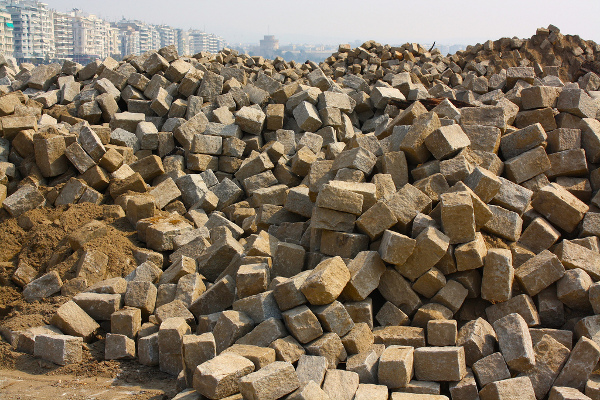
I’m covering the Thessaloniki International Film Festival for Filmmaker right now, and some images from the March documentary event seem prescient in the light of the hour-by-hour unfolding of events in Greece, where the fall of a government could affect all of Europe, the world economy, and by extension, filmmaking everywhere. Here are some of my photos.

Thessaloniki is a palimpsest, a city written upon other cities, incarnation atop incarnation. The history of this far northern Greek city since first dredged from the sea by Alexander the Great has been one of fall and rise, of fire and quake. And politics.
The economic crash and Euro-crisis of October and November were still months away. Dominoes were only just lining up: On the opening night of the 13th Thessaloniki International Film Festival in March 2011, another war had begun hours, minutes, earlier: the United States was assisting the first European sallies against Gaddafi’s Tripoli. Greece—and the festival—were pitching another form of battle, against the general economic crisis as well as a multi-million euro deficit legacy from prior administrations.
So it was a telling, if unintended image, to see the cobbles of the Provlita, or pier, where much of the festival takes place, in tall piles while under reconstruction, bricks braced against the 1950s Mediterranean developer’s fashion of ten-story tall apartment blocks that look out onto Thermaikos Bay, and on a good day, further out, the Aegean Sea and the intermittent apparition of Mt. Olympus. (The city’s iconic symbol, The White Tower, can be glimpsed just above the rubble.)
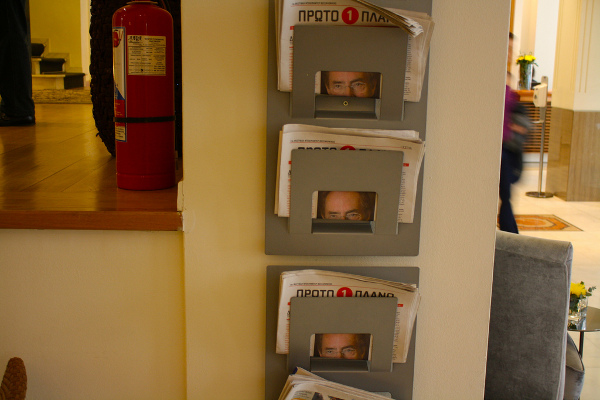
Dimitri Eipides (seen on the cover of the festival publication, Proto Plano, or “Opening Shot”) is director of both the documentary festival and the November festival, now in its fifty-third year. The documentary festival alone showed 220 films, as well as offering a vital Doc Market. But personalities drawn to the festival’s earnest traditions and the embrace of Greek hospitality are what set both TIFF and TIDF apart.
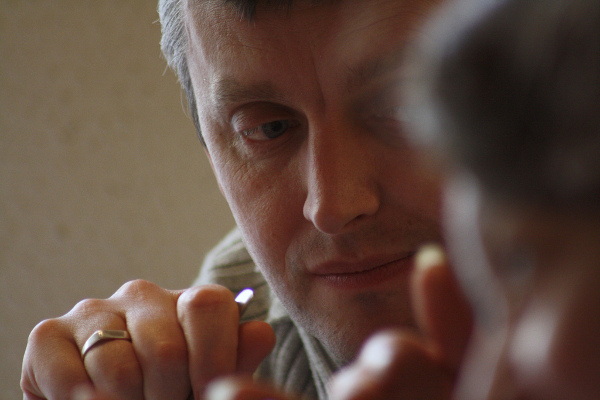
Retrospectives included Czech director Helena Treštíková, who specializes in long-term observational films about women and a dozen programs from Thessaloniki’s own Kyriaki Malama. At her press conference, Malama said, “A documentary can only highlight issues, not offer solutions. It can stimulate the mind of the viewer, who can then give the solutions and raise his voice. Silence is for lambs, not people.” Also shown: the little-seen equation-like documentaries of Russian director Sergei Loznitsa, illuminating the roots of the dense nightmares of his fiction feature My Joy.
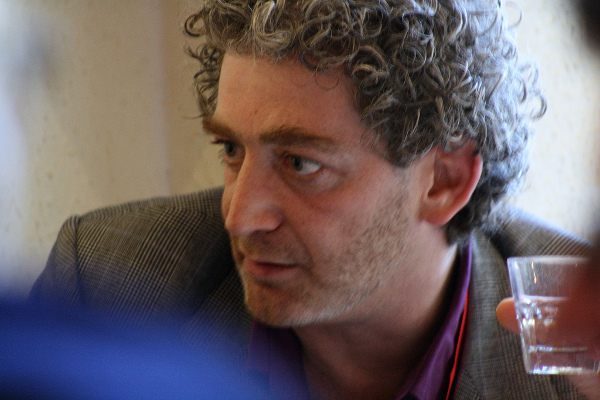
Directors from across Europe, Greece and the Balkans meet, talk, toast ouzo or the grappa-like tsipouro: here, Israeli director Eyan Sivan (Jaffa, The Orange’s Clockwork).
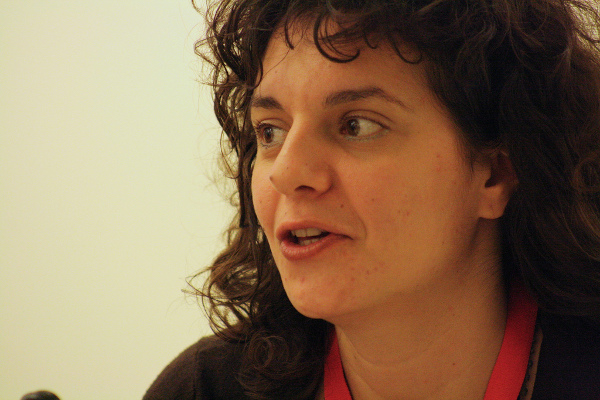
The backbone of the festival is a resourceful staff comprised largely of women, including Elena Christopoulou, who conducted the “Just Talking” series, daily conversations between journalists, audiences and filmmakers like Amir Bar-Lev (The Tillman Story), Tom Jarmusch (the no-fi Cleveland tale Sometimes City), Phil Grabsky (The Boy Mir: Ten Years in Afghanistan) and Laëtitia Moreau (A Future without Oil). Christopoulou also programmed and supervised “How I Am: Challenging Perceptions,” a major sidebar event, gathering 30 films about learning disabilities from the past five years that had not been seen in Greece. Features like Jennifer Venditti‘s Billy the Kid, Sandrine Bonnaire‘s Her Name Is Sabine, Ilana Trachtman‘s Praying with Lior and Michael Orion Scott‘s The Horse Boy were among the films that played to student-heavy audiences.
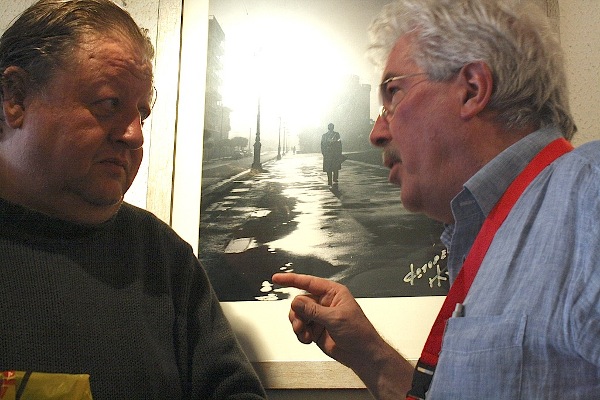
While Greek audiences carry heightened conversations directly out of showings into the street, among meeting of filmmakers, conspiracies, of a good kind, are expected with attendees like documentary colleagues filmmaker-producer-mentor-doc cheerleader Peter Wintonick (Necessary Illusions Productions) and distributor Jan Rofekamp (Films Transit).
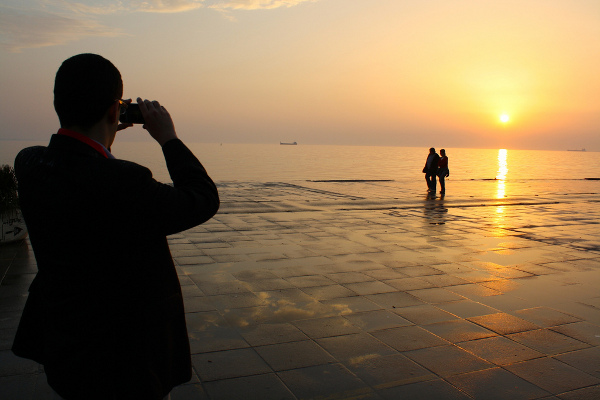
A touristy view of the city is there for the savoring any time of day or night, just outside the major festival locales. And there is nothing wrong with shooting a photo of a sunset several other people are also shooting photos of. It is Greece, after all.
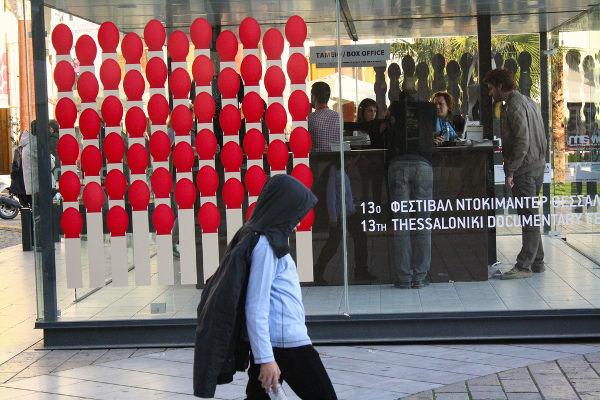
The festival’s graphics are often provocative, and in the context of March, let alone the months before the Film Festival (and the fall of the Papandreou government) in November, the arrays of stick matches, thick as kindling, were, well, striking, even without a kid in a hoodie with an empty plastic bottle walking past.
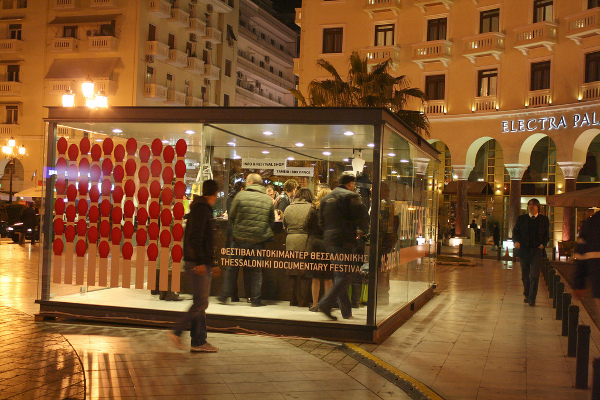
From a distance, both of the festival’s gleaming glass ticket boxes are packed by day and by night: with the TIDF 13 graphics, it looks like nothing less than a powder keg with Greek citizens looking for dispatches from around the documentary world.
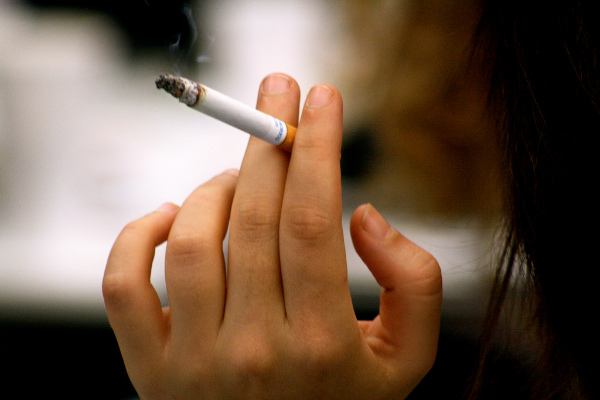
The night grows long. The ash grows long.
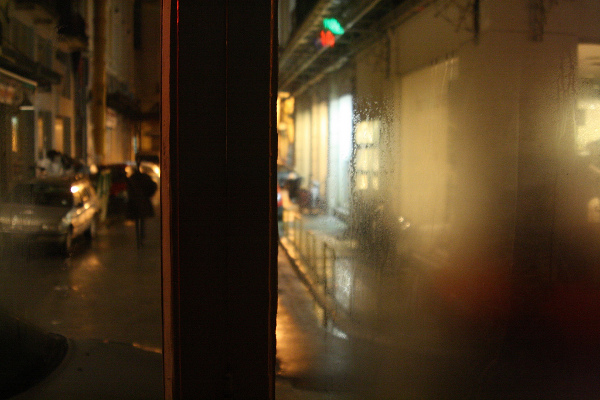
Fog can descend, anytime around the clock. Around the corner, there’s music. Down the streets, tavernas and ouzerias are still serving. The fog’s damp embrace is comforting, as are the wafting smells of food. It feels like civilization.
Ray Pride’s report from November’s 53rd Thessaloniki International Film Festival will be in the Winter 2012 issue. The TIDF 2011 list of awards is here.
